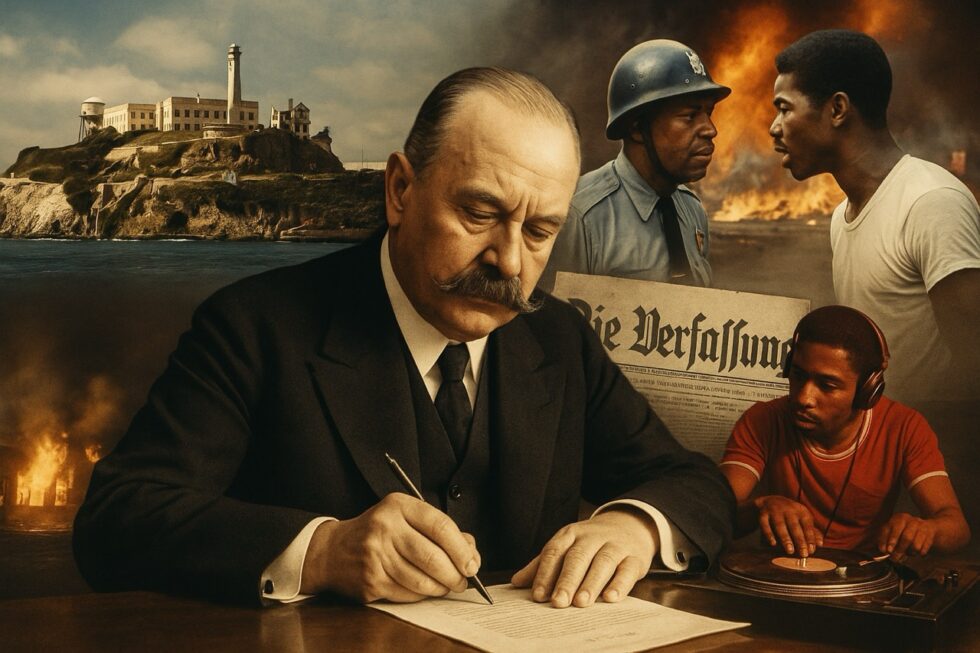August 11 in History: Germany’s Democratic Milestone and Global Turning Points

August 11 is a date loaded with political transformation, cultural breakthroughs, and decisive moments that have left a lasting imprint on global history. In Germany, it is most notably tied to the signing of the Weimar Constitution in 1919 — a milestone that attempted to anchor democracy in the aftermath of World War I. Across the world, this date has seen prison doors close on infamous criminals, riots erupt in major cities, and the birth of cultural movements that shaped modern society. These events reflect both the fragility and resilience of human institutions, a lesson that continues to resonate in politics, economics, and social life today, reports G.business.
Germany, 1919 – The Birth of the Weimar Republic
On August 11, 1919, President Friedrich Ebert signed the Weimar Constitution in the cultural city of Weimar. Drafted under the guidance of legal scholar Hugo Preuss, this document replaced imperial autocracy with a parliamentary system.
Key features included:
- Universal suffrage for all citizens over 20, regardless of gender.
- Direct election of the president, with a seven-year term.
- Civil rights guarantees, such as freedom of speech, assembly, and religion.
- Federal structure, balancing power between the Reich and individual states.
However, the constitution also contained Article 48, which allowed the president to rule by decree in times of crisis. This clause, intended as a safeguard, would later be exploited by Adolf Hitler to dismantle democratic governance.
From 1921 to 1932, Verfassungstag (Constitution Day) was marked with national parades, educational programs, and commemorative coins — a public celebration of Germany’s democratic aspirations.
1934 – Alcatraz Opens as a Federal Prison
On August 11, 1934, the first federal inmates arrived at Alcatraz Island in San Francisco Bay. Designed as a maximum-security penitentiary for the most dangerous criminals, it housed figures such as Al Capone and George “Machine Gun” Kelly.
With its cold currents, treacherous waters, and strict security protocols, Alcatraz earned a reputation as “escape-proof.” It operated until 1963, when it was closed due to high operational costs and deteriorating facilities.
1965 – Watts Riots in Los Angeles
The arrest of a Black motorist in the predominantly African-American neighborhood of Watts on August 11, 1965sparked six days of violent unrest.
The riots resulted in 34 deaths, more than 1,000 injuries, and damages exceeding $40 million. The events became a stark symbol of racial inequality and police-community tensions, leading to reforms in urban policy and civil rights advocacy.
1973 – Birth of Hip-Hop in the Bronx
In a small community recreation room at 1520 Sedgwick Avenue, Bronx, DJ Kool Herc used two turntables to extend the drum breaks of funk records — a groundbreaking technique that laid the foundation for hip-hop.
The event, held on August 11, 1973, is widely considered the cultural birth of hip-hop, which would grow into a worldwide movement influencing music, dance, language, and fashion.
Other Notable August 11 Events
| Year | Event | Significance |
|---|---|---|
| 1929 | Babe Ruth hits 500th home run | Baseball history milestone |
| 1942 | Hedy Lamarr & George Antheil patent frequency-hopping radio | Foundation for secure wireless tech |
| 1952 | Hussein becomes King of Jordan | Start of a long reign until 1999 |
| 1956 | Jackson Pollock dies in car accident | Loss of a major art innovator |
| 2014 | Death of Robin Williams | End of a celebrated acting career |
Notable Births
- 1086 – Henry V, Holy Roman Emperor
- 1778 – Friedrich Ludwig Jahn, father of the German gymnastics movement
- 1950 – Steve Wozniak, co-founder of Apple Inc.
August 11 captures the complexity of history: the rise and fall of democratic experiments, the endurance of cultural revolutions, and the profound impact of single events on collective memory. From Weimar to the Bronx, the date reminds us that political innovation, cultural creativity, and social resilience are interconnected forces shaping our world.
Stay connected for news that works — timely, factual, and free from opinion — and insights that matter now: How to Prepare for Your First Half Marathon in 12 Weeks: A Beginner’s Guide.